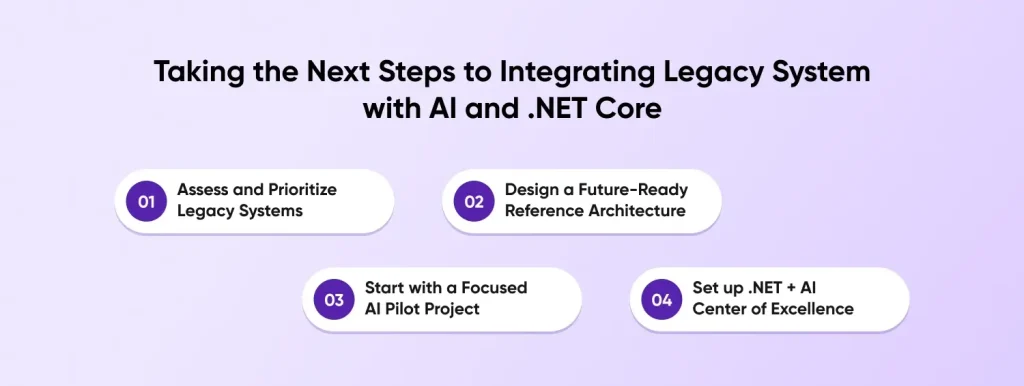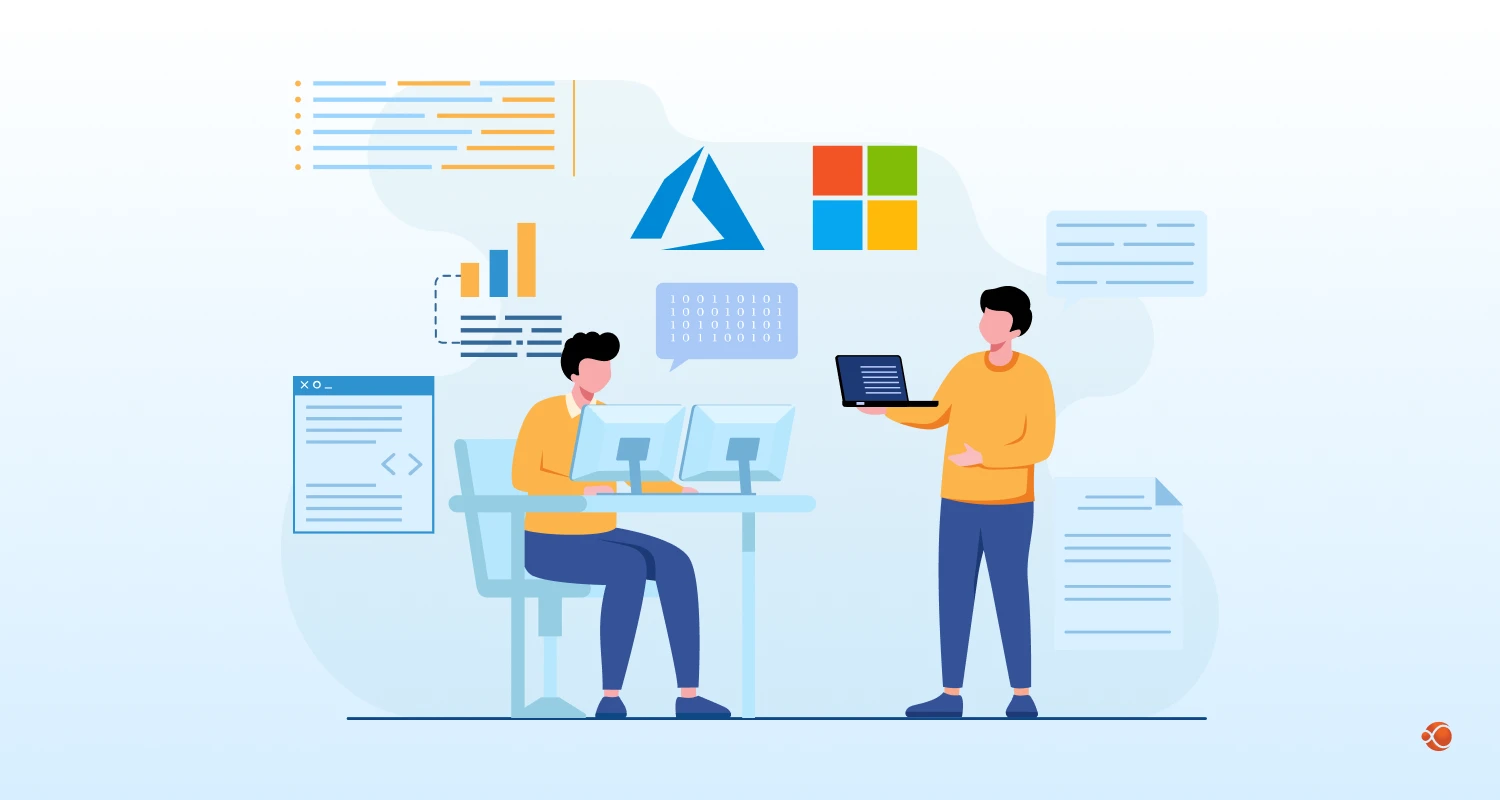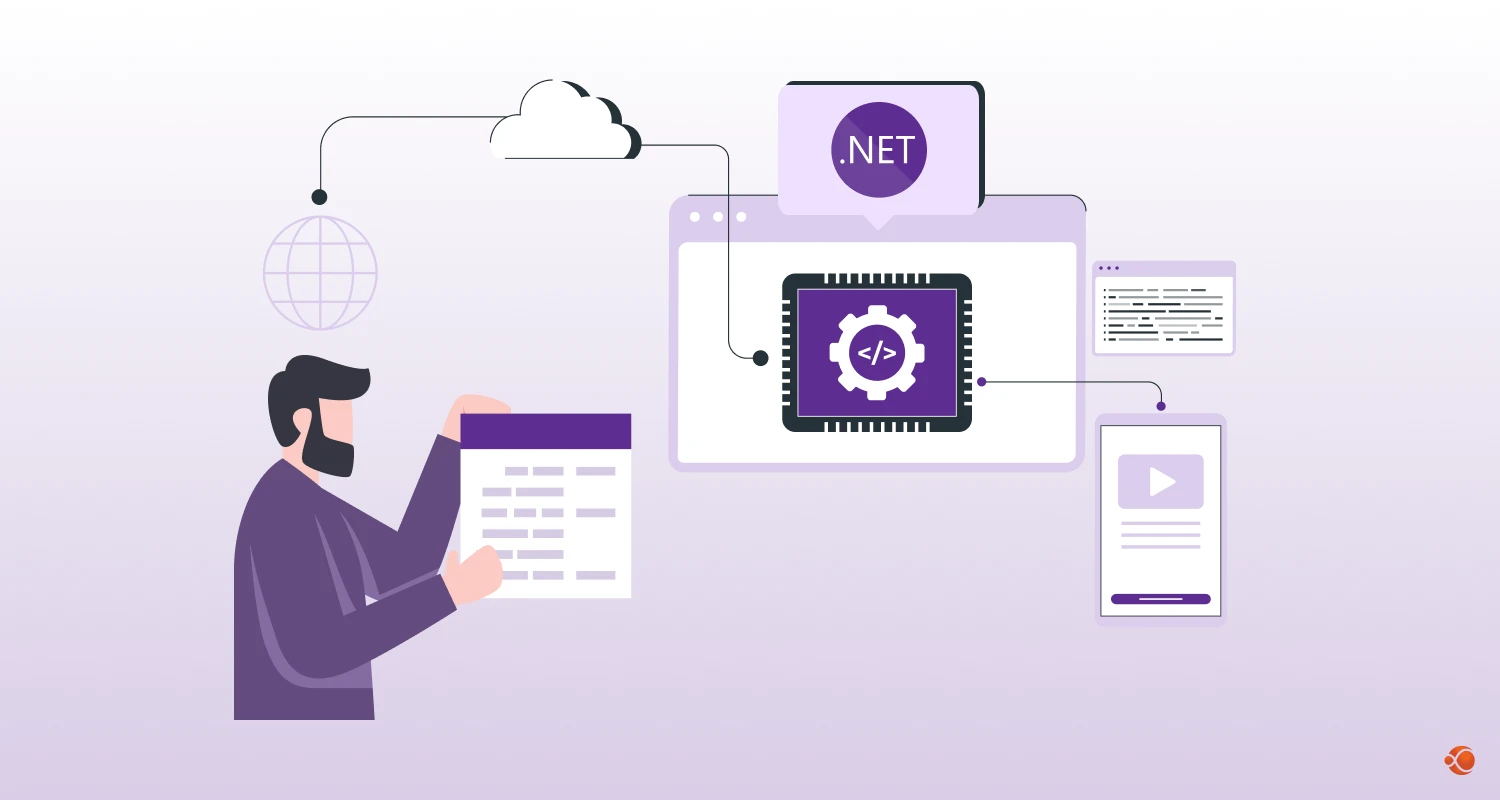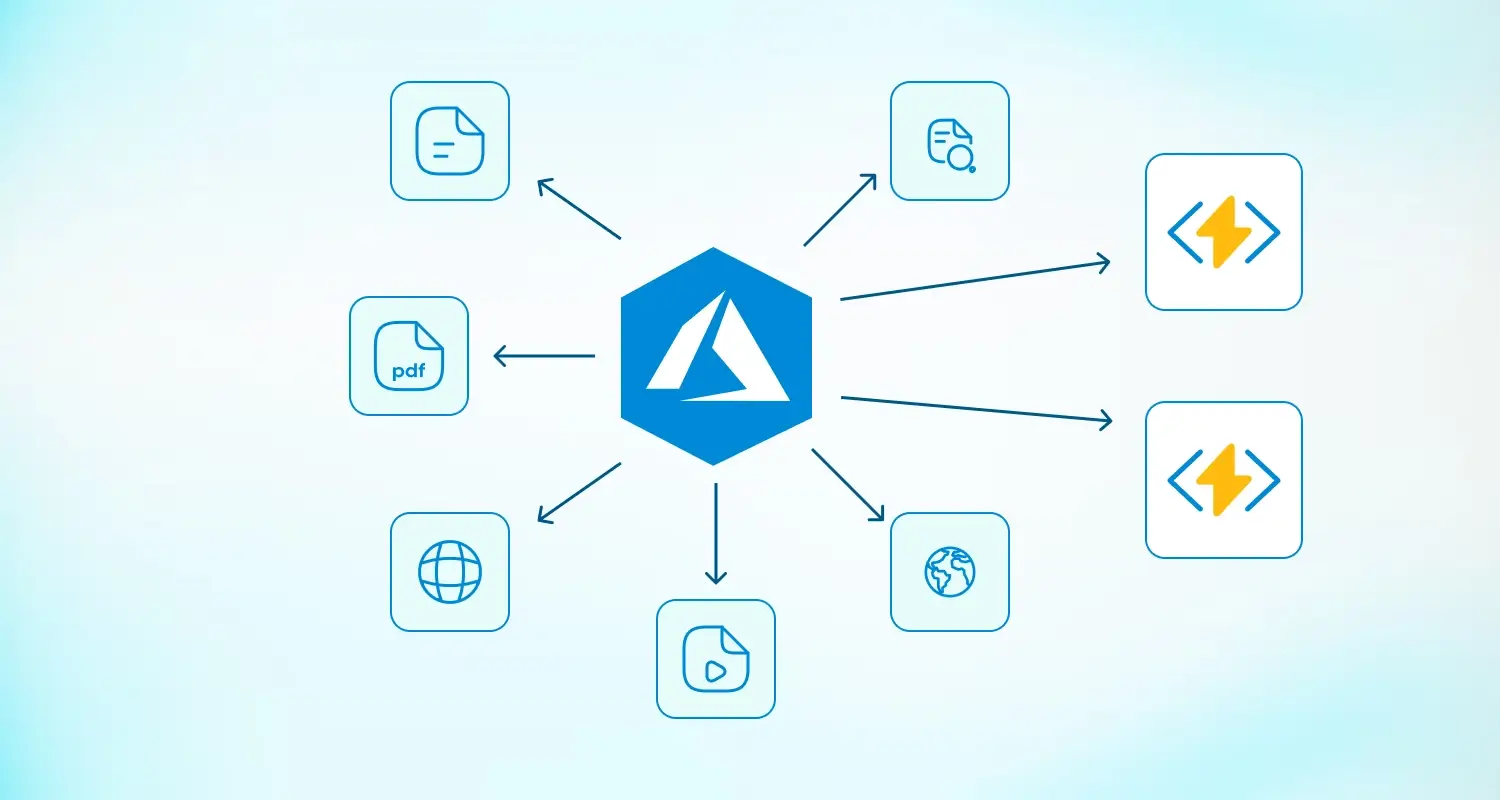The biggest challenge and requirement of this technology-first era is turning current systems and datasets to strategic assets while continuously embracing artificial intelligence.
Many enterprise-grade applications have been backed by .NET Core since years of their inception. Many of these applications have become or are slowly getting obsolete, unable to keep up with modern software or competitors. The good news however is that companies are now integrating AI into legacy systems with .NET Core and Microsoft AI tools, allowing a strategic modernization effort. They can preserve business logic while introducing AI in legacy systems, instead of committing to complete rewrite or developing a new application from scratch.
The Need For Legacy Modernization with AI
Enterprise systems built on earlier versions of .NET frameworks represent decades of industry expertise and business rule refinement. Yet, most of these systems often struggle to keep up with modern market demand for scalability, cloud deployment and integration with advanced analytics available in the market.
The major reason for this is the monolithic architectural constraints such as tightly coupled components, limited or absence of separation of concern , and poor testability. This raises a serious concern as there are many legacy apps built on .NET Core that struggle with modernization efforts due to such limitations. With our AI integration in custom ASP.NET Core applications services, we have seen our clients achieve 25-40% reduction in operational costs with significant improvements in business agility.
Most legacy apps that aren’t putting efforts into modernization or AI integration are either breaking even, or nearing their demise due to the inability to deliver personalized experiences and use data-driven insights that define market leaders in artificial intelligence legacy systems implementations.
Why .NET Core the Foundation for Intelligent Modernization?
Using .NET Core for legacy modernization has many advantages to not only meet the current modernization standards but also gain a competitive advantage with the endless capabilities and seamless integration potential. The new .NET Core framework is not just another iteration of Microsoft’s development framework, it’s an entire paradigm shift that reimagines application architecture for cloud-native, cross-platform and other modern features. For legacy system modernization, it provides many benefits that make it an ideal foundation for integrating AI into legacy systems.
Here are some of the most important benefits you can expect when migrating traditional .NET framework applications to modern .NET Core systems:
| Aspect | Traditional .NET Framework | Modern .NET Core / .NET (5/6/7+) |
| Architecture Style | Primarily Monolithic | Supports Microservices, Modular, and Serverless Architectures |
| Platform Support | Windows-only | Cross-platform (Windows, Linux, macOS) |
| Deployment Model | IIS-based, tightly coupled deployments | Flexible: Self-contained, Docker, Kubernetes, Cloud-native |
| Performance | Slower startup and memory usage | High performance, optimized GC, better throughput |
| Scalability | Limited horizontal scalability | Easily scalable with container orchestration and microservices |
| Cloud Readiness | Requires adaptation for cloud migration | Designed for the cloud (Azure-ready) |
| Dependency Management | Global Assembly Cache (GAC), tight coupling | NuGet-based, side-by-side versioning, loosely coupled |
| Configuration System | Rigid web.config files | Flexible JSON-based and hierarchical configuration |
| Development Tools | Visual Studio (Windows only) | VS Code, CLI, Visual Studio (Cross-platform support) |
| Open Source Ecosystem | Closed source, limited community involvement | Fully open source, strong community and Microsoft support |
| AI/ML Integration | Limited, external tools required | Seamless integration with ML.NET, Azure AI, and Cognitive Services |
| API Development | Web Forms, WCF, older Web APIs | Modern RESTful APIs via ASP.NET Core |
| Testing and CI/CD | Difficult to isolate and test components | Built-in dependency injection, modularity improves unit/integration testing |
| Security and Compliance | Legacy compliance models | Modern identity (OAuth2, OpenID), better patching and updates |
| Maintenance and Updates | Slower release cycles | Rapid iteration, support for long-term support (LTS) versions |
How to use Microsoft AI System for .NET Core Integration and AI modernization?
The Microsoft AI ecosystem provides a complete set of toolkits for introducing artificial intelligence capabilities to modern applications. These different Microsoft AI tools provide different functionalities and features rather than taking a one-size-fits-all approach.
Specialized Microsoft development services providers know how to use these Microsoft AI tools integration options to build custom AI-ready .NET core applications based on the unique requirements of the client and their legacy systems.
Here are the core Microsoft AI tools that are used for integrating AI with .NET Core:
The Role of Azure Cognitive Services for AI Integration in Legacy Systems
Azure Cognitive Services in legacy apps make use of pre-trained models that are accessible through REST APIs. They provide immediate business value without needing in-depth machine-learning expertise. These services work across many intelligent AI capabilities such as text-to-speech services, computer vision, and decision support algorithms and suggestions. The biggest benefit of implementing Azure cognitive services for integrating AI into legacy systems is its ability to maintain a clean separation between AI functionality and core business logic.
Common enterprise scenarios include sentiment analysis for customer feedback, text analytics for document processing, and computer vision for manufacturing quality control. Each capability integrates seamlessly with modernized custom ASP.NET Core development services, improving intelligence without disrupting established business processes.

How does .NET Core for Legacy Modernization use ML.NET?
ML.NET is a reliable Microsoft AI tool that can be seamlessly integrated into the .NET Core ecosystem for legacy modernization. It is a complete platform specialized for training and deploying customized machine learning models. ML.NET is mainly ideal for businesses looking for custom predictive analytics capabilities that align with proprietary data structures and domain-specific requirements.
ML.NET can be used for predictive maintenance to help enterprises forecast equipment failures or maintenance requirements before suffering a huge loss. It also maintains technical consistency when delivering important business value through reduced downtime and optimizes maintenance scheduling.
Using Azure Open AI Services for Advanced Language Capabilities for Enterprise Applications
Azure OpenAI Service provides robust language models within a secure Azure environment, addressing enterprise requirements for data governance and compliance. This service improves legacy business processes with fine language understanding capabilities previously unavailable in traditional applications.
Key applications include intelligent document processing for contracts and invoices, enhanced customer service through automated routing and response generation, and knowledge mining from unstructured enterprise data. These capabilities transform manual workflows by extracting structured information from unstructured text, improving both accuracy and processing efficiency.
💡 Pro Tip: Leverage AI consulting services from an IT company that also specializes in Microsoft development services. This will help you to create a perfect personalized tech Microsoft tech stack for AI implementation and legacy application modernization.
Strategies for integrating AI into Legacy Systems with .NET Core and Microsoft AI Tools
Successful legacy system modernization with AI requires a methodical approach that balances technical transformation with business continuity. A proven implementation strategy involves several key patterns and practices that minimize risk while maximizing value. Working with experienced teams who provide AI Consulting Services can significantly accelerate this transformation.
1. Strangler Fig Pattern for Incremental Migration
The Strangler Fig pattern enables gradual migration by intercepting calls to legacy systems and selectively routing them to modernized components. This approach implements an API Gateway using .NET Core that acts as an intelligent intermediary, minimizing risk while facilitating the incremental introduction of AI capabilities into high-value application segments.
2. Domain-Driven Design for Intelligent Service Boundaries
Domain-Driven Design principles create thoughtful service boundaries that align with business capabilities, establishing natural integration points for AI services. By identifying bounded contexts within legacy applications, architects can strategically target domains with the highest potential for AI-driven improvements in decision support, automation, and predictive capabilities.
3. Event-Driven Architecture for Real-Time Intelligence
Event-driven architectural patterns overcome the batch-processing limitations of legacy systems, enabling stream processing and real-time intelligence. By implementing event sourcing and message brokering on the .NET Core platform, organizations create responsive systems that process events as they occur, applying AI capabilities to deliver immediate insights and trigger automated responses.
Benefits of Integrating AI into Legacy Systems with Microsoft AI Tools and .NET Core
There are many strategic benefits of intelligent legacy system transformation with AI and .NET Core. It truly helps with most common legacy systems challenges and provides many intelligent automation and advanced features to improve its capabilities further:
Enhanced Decision Intelligence
Businesses are able to use ML.NET and other Microsoft AI tools capabilities for training machine learning models, and improving predictive analytics capabilities. This ability helps organizations take a proactive approach rather than reactive approach to identifying issues, challenges and opportunities based on past data and possible future predictions.
For instance, a manufacturing company can modernize its production planning system with ML.NET-based demand forecasting. With the help of custom ASP.NET Core development services from a reliable AI consultation and implementation expert, this can help organizations reduce inventory costs by 15-20%, while improving order-fulfilment rates, anticipating demand fluctuations and more with greater accuracy in comparison to traditional forecasting methods.
Improved Operational Efficiency Through Intelligent Automation
AI integration in ASP.NET Core applications provides complete automation for complex processes that would otherwise need human intervention. When we embed intelligence directly into operational workflows, organizations only need a supervisor to check the workflow automation is working as intended, that too if they feel it’s required.
A fintech company wanting to modernize its loan processing systems could look for intelligent document processing and risks assessment services. This helps them reduce processing time from days to minutes with improved underwriting quality with more thorough analysis.
Customer Experience Transformation
By integrating Azure Cognitive Services into customer-facing applications, organizations are able to redefine customer experience and encourage users to take more proactive engagement experience, resulting in better conversion rates and interactions with the app’s content and services.
What are the Factors Affecting the Cost of Integrating AI into Legacy Systems?
All benefits, considerations and strategies of implementing AI into legacy systems are more of an after-thought. First, you need to understand and prepare for the estimated budget of AI legacy system modernization with .NET Core. The overall cost depends on various factors depending on the level, scope, use cases and other such aspects of what you want from this integration.
Here is a systematic cost breakdown of investment components that will help decision makers with a framework for budgeting their strategic initiatives:
| Implementation Phase | Description | Typical Investment Range (USD) |
| Discovery & Architecture | System assessment, modernization roadmap, and AI capability planning | $24,000 to $54,000 |
| Core Platform Modernization | Migration to .NET Core, architecture refactoring, and infrastructure updates | $53,000 to $175,000 |
| Data Pipeline Development | Data extraction, transformation, and preparation systems for AI consumption | $45000 to $90,000 |
| AI Capability Implementation | Integration of specific AI services, model development, and training | $58,000 to $108,000 |
| Integration & Testing | End-to-end testing, performance optimization, and production deployment | $33,500 to $61,000 |
| Knowledge Transfer & Training | Technical documentation and team training on new AI-enabled systems | $12,000 to $44,500 |
Note: Please also keep in mind the operational costs like infrastructure costs, model maintenance costs and other hidden charges that might go amiss. Make sure to hire ASP.NET Core developers from a reliable software development company that provides complete pricing transparency and project NDA and SLAs before initiating any project.
Taking the Next Steps to Integrating Legacy System with AI and .NET Core

Successful integration of AI into legacy systems begins with a clear understanding of current capabilities and strategic objectives. For organizations considering this transformation, we recommend going for AI software development services that take the following approach:
1. Assess and Prioritize Legacy Systems
Conduct a thorough assessment of existing applications, identifying high-value modernization candidates based on business impact and technical feasibility.
2. Design a Future-Ready Reference Architecture
Develop a reference architecture that leverages .NET Core as the foundation for modernized components while establishing clear integration patterns with Microsoft AI services.
3. Start with a Focused AI Pilot Project
Implement a pilot project focused on a specific business capability, demonstrating value through measurable outcomes before expanding to broader transformation initiatives.
4. Set up .NET + AI Center of Excellence
Establish a center of excellence that combines technical expertise in .NET Core development with domain knowledge and AI implementation experience.
Final Words
Modernizing legacy systems using .NET Core and Microsoft AI tools is a smart decision to improve performance, intelligence and scalability of existing legacy apps. This provides instant benefits, and long-term benefits of cost-savings, future-readiness, and ability to handle concurrent requests and heavy traffic spikes.
By using Microsoft tools like Azure AI, ML.NET and Cognitive Services, organizations get powerful assets for automation, predictive analytics and smart-decision making. Hire AI developers who know how to reduce the technical debt of legacy systems, making them an important asset for the organization rather than a liability.
FAQs on Integrating AI into Legacy Systems with .NET Core and Microsoft AI Tools
What are the best practices for creating AI applications with .NET?
You can use frameworks like ML.NET or integrate Azure Cognitive Services to your legacy systems. It is important to keep the legacy systems architecture decluttered and modular for easy updates and maintenance. Ensure your data is well-prepared and models are properly validated. Logging, testing, and performance monitoring are key throughout development.
Can AI applications built with .NET be scaled on Azure?
Apps built with .NET and AI can scale effectively on Azure with Kubernetes or even App Services. Azure has load balancing, auto-scaling and a strong infrastructure support that maintains performance as user demand scales.
How does the integration of .NET with Azure benefit AI developers?
Integrating .NET with Azure is great for developers as it gives them many pre-built component libraries, cloud services and data pipelines to create AI-enabled .NET Core projects. It reduces initial setup time and streamlines manual development processes. Plus, Azure’s tools improve app performance and support continuous delivery.
What are some common challenges in AI development with .NET and Azure?
The most pressing challenges can come from having to maintain large datasets, training machine learning models at scale and keeping cloud deployment costs in check. It is important to ensure smooth deployment while maintaining model accuracy over time. Security and compliance can be additional hurdles in enterprise projects.







